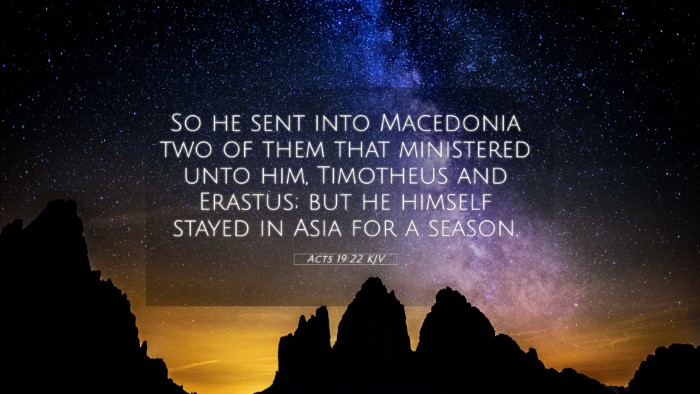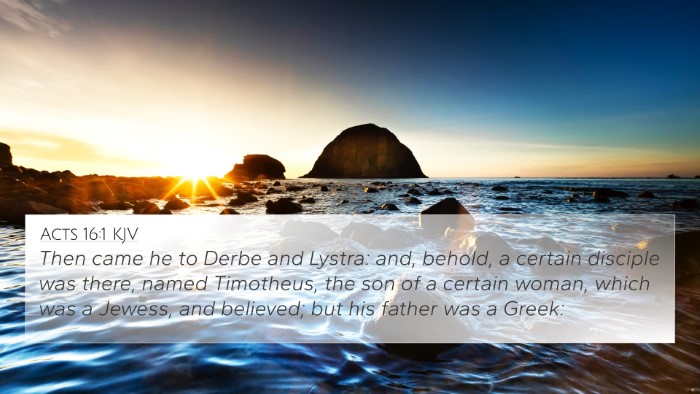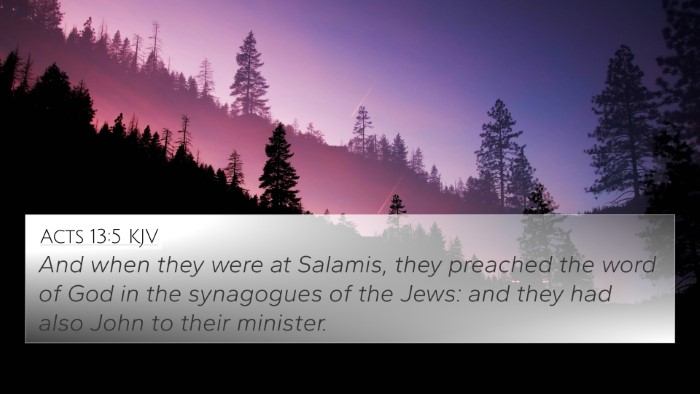Understanding Acts 19:22
Acts 19:22 states: "So he sent into Macedonia two of his helpers, Timothy and Erastus; but he himself stayed in Asia for a time." This verse occurs during Paul's third missionary journey, highlighting the strategic planning and the collaboration among early Christian leaders.
Summary of Acts 19:22
This passage illustrates Paul's organizational approach to spreading the Gospel. By sending Timothy and Erastus to Macedonia, Paul demonstrates effective leadership and a commitment to the mission of the church. He remains in Asia, emphasizing the need for both leadership on-site and delegation of responsibilities.
Insights from Public Domain Commentaries
Matthew Henry Commentary
Matthew Henry notes that this delegation indicates the importance of teamwork in evangelism. Timothy was often the disciple of Paul and played a crucial role in furthering the Gospel's reach. The delayed departure of Paul suggests a deliberate strategy in nurturing the church in Ephesus.
Albert Barnes Commentary
Albert Barnes emphasizes Paul’s foresight in designating key individuals for mission work. He highlights that Timothy was known for his character and dedication, making him an excellent choice for leading the effort in Macedonia. This illustrates a model of mentorship and trust in the early church.
Adam Clarke Commentary
Adam Clarke remarks on the significance of Macedonia as a pivotal region for spreading Christianity. He mentions that Erastus, likely a prominent member of the Corinthian church, adds importance to the mission, showcasing the interconnectedness of the growing Christian community.
Connections to Other Bible Verses
Acts 19:22 establishes multiple links to other scriptures, enriching the understanding of the passage. Below are some key cross-references:
- 1 Corinthians 4:17 - Paul sends Timothy as a beloved son to remind the Corinthians of his teachings.
- Philippians 2:19-22 - Timothy’s genuine care for the Philippian believers reinforces his role as a messenger.
- 2 Timothy 1:5 - Timothy’s faithfulness is rooted in his upbringing, connecting the theme of mentorship.
- Romans 16:23 - Erastus is mentioned as the city treasurer, showing his esteemed standing in the church.
- Acts 16:1-3 - The introduction of Timothy in Lystra, underlining his character and role in ministry.
- Acts 18:20-21 - Paul's strategy in planning where to go and whom to send aligns with his previous decisions to remain in certain areas for a time.
- 2 Corinthians 1:19 - References to the ongoing work Paul and his companions engaged in when spreading the faith.
Thematic Bible Verse Connections
The theme of collaboration in ministry is prevalent throughout the New Testament. Acts 19:22 illustrates the importance of appointing trusted leaders in new regions, resembling Jesus’ sending of the disciples in pairs (Luke 10:1).
Application and Reflection
- This verse invites believers to consider how they can play a part in the mission of the church.
- It challenges individuals to develop relationships and invest in the lives of others, as seen with Paul's mentorship of Timothy.
- Reflecting on how one can support those in leadership or mission can create a stronger community and deepen one’s faith.
Conclusion
Acts 19:22 serves as a reminder of the strategic and communal aspects of church leadership. It encourages believers to engage in supporting the spread of the Gospel through teamwork and comprehensive involvement with one another. Understanding this verse in the context of cross-referencing Biblical texts provides a more profound insight into the significance of community in Christian life.
Additional Cross-Referencing Resources
For further study, consider utilizing tools for Bible cross-referencing such as a Bible concordance or a cross-reference Bible study guide. These resources can enhance your understanding of the connections between Bible verses, allowing for deeper engagements in themes, including:
- How to find cross-references in the Bible
- Identifying connections in the Old and New Testament
- Cross-referenced themes in the Bible
- Comparative study of Pauline epistles and their interconnected messages

















